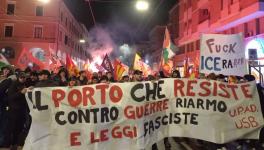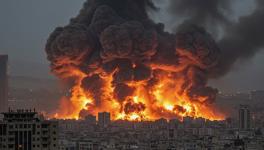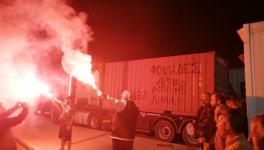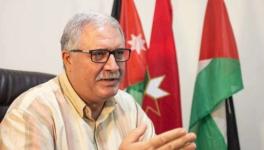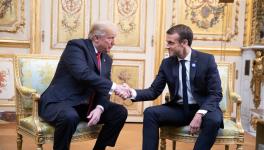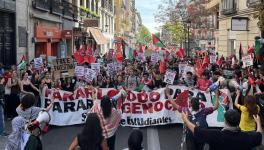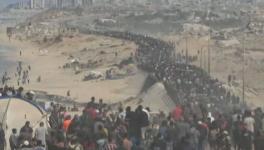Genocide as Pattern and Policy: ICJ Hears South Africa’s Case Against Israel
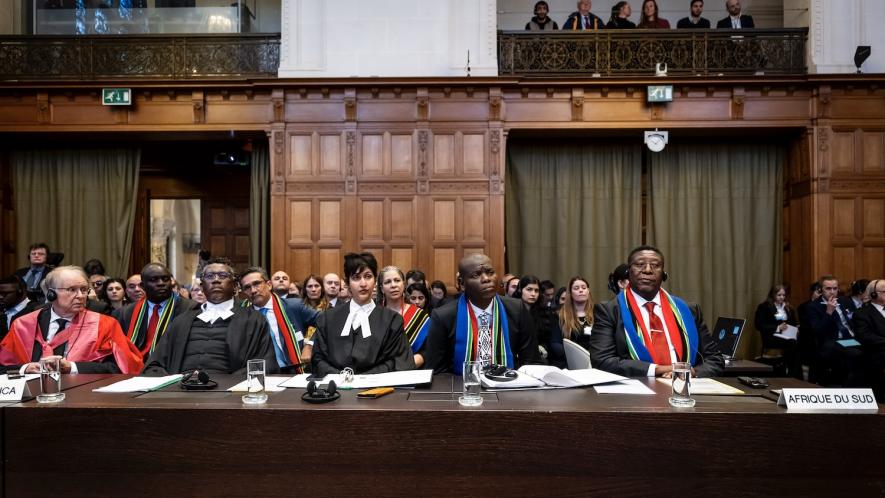
Members of the South African Delegation at the ICJ. Photo: ICJ
On January 11, South Africa presented its arguments before the International Court of Justice (ICJ) in its historic case accusing Israel of committing genocide in the Gaza Strip. As proceedings began on Thursday morning, hundreds of people gathered outside the court in The Hague, chanting “Stop, stop genocide” and “we are all Palestinians”.
The arguments on South Africa’s behalf were presented by a team of six lawyers- Adila Hassim, Tembeka Ngcukaitobi, Max Du Pleiss, Vaughan Lowe, Blinne Ní Ghrálaigh, and John Dugard.
The ICJ’s has a 15-member panel of judges, each of whom are from different countries and elected for a nine-year term by the UN General Assembly and the Security Council. For the purpose of this case, Israel and South Africa have each nominated an ad-hoc judge to sit on the panel.
South Africa has argued that “against a background of apartheid, expulsion, ethnic cleansing, annexation, occupation, discrimination, and the ongoing denial of the right of the Palestinian people to self-determination— Israel, since October 7, 2023 in particular, has failed to prevent genocide and has failed to prosecute the direct and public incitement to genocide”.
This, the application argues, is a violation of Israel’s obligations under the 1948 Convention on the Prevention and Punishment of the Crime of Genocide.
Addressing the ICJ on Thursday, South Africa’s ambassador to the Netherlands, Vusimuzi Madonsela, stated that Pretoria “had recognized the ongoing Nakba of the Palestinian people through Israel’s colonization since 1948”, and that the “genocidal acts and permissions by the State of Israel inevitably form part of a continuum of illegal acts” perpetrated against Palestinians since then.
This was echoed by Justice Minister Ronald Lamola, who stated that the Palestinian people had “experienced systematic oppression and violence for the last 76 years, on October 6 2023, and every day since October 7, 2023.”
In order to protect against “further, severe, and irreparable harm” to the Palestinian people, and given that Israel has “continued, escalated, and threatened further to escalate its military campaign”, South Africa has called on the ICJ to indicate urgent provisional measures, including ordering Israel to immediately cease its military campaign in Gaza and to desist from committing any and all acts defined as genocide under the Genocide Convention, and to ensure the preservation of evidence related to the allegations raised in the case.
The hearing on these provisional measures is currently underway in the Hague and will conclude on January 12.
This is genocide.
South Africa, in its application, has argued that acts committed by Israel are genocidal in character “because they are intended to bring about the destruction of a substantial part of the Palestinian national, racial and ethnical group”.
These acts, as explained in the application and presented before the court on Thursday, include “killing Palestinians in Gaza, causing them serious bodily and mental harm, and inflicting on them conditions of life calculated to bring about their physical destruction.”
Speaking before the court, Adila Hassim, senior counsel for South Africa, stated that Israel’s actions show “a systematic pattern of conduct from which Genocide can be inferred”.
Hassim reiterated Gaza’s status as a constituent territory of the Occupied Palestinian territories, highlighting that Israel continued to exercise control over Gaza’s territorial waters, land crossings, electricity, and even certain key governmental functions.
Palestinians have been subjected to “one of the heaviest conventional bombing campaigns in the history of modern warfare”, Hassim noted. As of January 11, over 23,400 people had been killed in Gaza.
“This killing is nothing short of the destruction of Palestinian life. It is inflicted deliberately, no one is spared, not even newborn babies.”
She also noted in her address that Palestinians in Gaza are also at “immediate risk of death by starvation, dehydration, and disease as a result of the ongoing siege by Israel, the destruction of Palestinian towns, the insufficient aid being allowed through to the Palestinian population and the impossibility of distributing this limited aid while bombs fall.”
“This conduct renders essentials to life unobtainable,” Hassim said. “Israel has deliberately imposed conditions on Gaza that cannot sustain life and are calculated to bring about its physical destruction,” she added later.
Hassim stated that Israel had done this in four ways, including by the forced displacement of Palestinians, highlighting that the first evacuation order issued by Israel for civilians to move from the north to the south of Gaza was itself genocidal, given that for many Palestinians this displacement would be inevitably permanent, given the scale of destruction.
“Genocides are never declared in advance, but this court has the benefit of the past 13 weeks of evidence that shows incontrovertibly a pattern of conduct and related intention that justifies a plausible claim of genocidal acts,” Hassim said.
Stated genocidal intent in official positions
Central to South Africa’s case is the “specific requisite intent” that differentiates Israel’s actions in Gaza since October 7 from the other crimes it has committed against the Palestinian people– specifically, the intent to destroy the Palestinians in Gaza as part of the broader Palestinian national, racial, and ethnical group.
This genocidal intent “is evident from the way in which Israel’s military attack is being conducted”, said Tembeka Ngcukaitobi, fellow senior counsel for South Africa. “It is systematic in its character and form”… One percent of the Palestinian population in Gaza has been systematically decimated, and one in four others have been injured since October 7.”
“Israel’s political leaders, military commanders and persons holding official positions have systematically and in explicit terms declared their genocidal intent. These statements are then repeated by soldiers on the ground in Gaza as they engage in the destruction of Palestinians and the physical infrastructure of Gaza.”
Ngcukaitobi later referenced videos of Israeli soldiers on December 7 2023, dancing and chanting “we know our motto: there are no uninvolved” and “that they obey one commandment, to wipe off the seed of Amalek” — a reference to a statement by Prime Minister Benjamin Netanyahu to “remember what Amalek has done to you”. Ngcukaitobi added that Israeli soldiers had filmed themselves committing atrocities against Palestinians in the form of “snuff videos”.
“Israel’s special genocidal intent is rooted in the belief that in fact the enemy is not just the military wing of Hamas or indeed Hamas generally, but is embedded in the fabric of Palestinian life in Gaza.”
South Africa’s application has provided seven pages of documentation of this genocidal intent in the form of statements and speeches delivered by Israel’s political and military leadership, members of the Knesset who have repeatedly called for Gaza to be “wiped out, flattened, erased, and crushed”, and even journalists and commentators who have called for Gaza to be turned into a “slaughterhouse”. Ngcukaitobi referenced several of these statements, highlighting the “language of systematic dehumanization”.
“These statements are not open to neutralizations and after the fact rationalizations and reinterpretations by Israel. The statements were made by persons in command of the state, they communicated state policy. it is simple— if the statements were not intended they would not have been made.”
“The intentional failure of Israel to condemn, prevent and punish such genocidal incitement constitutes in itself a grave violation of the Genocide Convention.”
Protect Gazans, now
Having clearly outlined the genocidal acts in Gaza and the intent informing their commission, South Africa emphasized the “erga omnes” rights and obligations under the Genocide Convention. “State parties to this convention are obliged not only to desist from genocidal acts but also to prevent them,” Professor John Dugard told the ICJ, in his address which outlined the prima facie jurisdiction of the Court.
He added that prior to filing the case, South Africa had sent the Israeli embassy a diplomatic note of its view that Israel’s actions amounted to genocide. However Israel’s response “failed to address the issues raised” and “neither confirmed nor denied the existence of a dispute”.
“What is happening in Gaza now is not correctly framed as a simple conflict between two parties. It entails instead destructive acts perpetrated by an occupying power, Israel, that has subjected the Palestinian people to an oppressive and prolonged violation of their rights to self-determination for more than half a century,” Max Du Pleiss, a fellow lawyer on the team said in his address.
“South Africa’s obligation is motivated by the need to protect Palestinians in Gaza and their absolute rights not to be subjected to genocidal acts,” he stated.
Blinne Ní Ghrálaigh, an Irish lawyer who was part of the legal team, described the severe humanitarian crisis in Gaza and the “risk of further genocidal acts and further irreparable harm” including a looming famine, an “unfolding public health disaster”, and the fact that “an average of 247 Palestinians were being killed or at the risk of being killed each day”.
“Entire multi-generational families will be obliterated and yet more Palestinian children will become WCNSF: wounded child, no surviving family, the terrible new acronym born out of Israel’s genocidal assault.”
“Despite the horror of genocide of the Palestinian people being live streamed from Gaza to our mobile phones, computers and television screens, the first genocide in history where its victims are broadcasting the destruction in real time in the desperate so far vain hope that the world might do something… Gaza is nothing short than moral failure.”
While outlining the provisional measures sought by South Africa on behalf of the Palestinian people, Vaughan Lowe reiterated that in order to issue these urgent measures, the ICJ did not need to “determine whether or not Israel has, or has not, acted contrary to its obligations under the Genocide Convention”.
Rather, “it is concerned now only with the question of what provisional measures are required pending the court’s final decision”.
Lowe also made clarifications on Israel’s right to self-defense– a right which the ICJ in its 2004 Advisory Opinion had ruled Israel could not invoke in a territory it was occupying– and which Israel and its allies have continued to cite since October 7.
“What Israel is doing in Gaza, it is doing in territory under its own control. Its actions are enforcing its occupation. The law on self-defense under Article 51 of the [UN] Charter has no application. The main point is much simpler. It is that no matter how outrageous or appalling an attack or provocation, genocide is never a permissible response”
Lowe said further, “The point is not simply that Israel is acting ‘disproportionately’: the point is that the prohibition on genocide is an absolute, peremptory rule of law. Nothing can ever justify genocide.”
“This is not a moment for the court to sit back and be silent. It is necessary that it assert its authority and itself order compliance with the obligations under the Genocide Convention,” Lowe stated.
In his concluding remarks, Ambassador Madonsela implored that “The consequences of not indicating clear and specific provisional measures and not taking steps to intervene while Israel disregards its international obligations before our eyes would, we fear, be very grave indeed: for the Palestinians in Gaza who remain at real risk of further genocidal acts, for the integrity of the convention, for the rights of South Africa, and for the reputation of this court which is equipped with and must exercise its powers to afford…realization of the rights under the convention.”
The world reacts
Meanwhile, in response to the proceedings, Hamas spokesperson Sami Abu Zuhri stated, “The Palestinian people are following the court session in The Hague with great concern and interest. We urge the court to reject all pressure and take a decision to criminalize the Israeli occupation and stop the aggression on Gaza.”
Following the hearing on Thursday, Progressive International held a public briefing outside the ICJ, with speakers including veteran socialist UK politician Jeremy Corbyn and Peter Mertens, a leader of the Workers’ Party of Belgium who stated that the proceedings were “not only about the Palestinians. This is a matter for all of humanity.”
Ada Colau, the former mayor of Barcelona under whom the Spanish city cut ties with Israel, also addressed the gathering: “Today we are here to defend human rights.We thank South Africa for this initiative and demand an immediate and permanent ceasefire.”
Israel’s response
Israel will present its oral arguments before the ICJ on Friday.
As a growing number of countries have expressed their support for South Africa’s case, on Wednesday January 10, the Israeli government shared a video of Netanyahu speaking in English, seemingly addressing some of the accusations against them in the ICJ case.
He stated: “I want to make a few points absolutely clear: Israel has no intention of permanently occupying Gaza or displacing its civilian population. Israel is fighting Hamas terrorists, not the Palestinian population, and we are doing so in full compliance with international law.”
Get the latest reports & analysis with people's perspective on Protests, movements & deep analytical videos, discussions of the current affairs in your Telegram app. Subscribe to NewsClick's Telegram channel & get Real-Time updates on stories, as they get published on our website.









